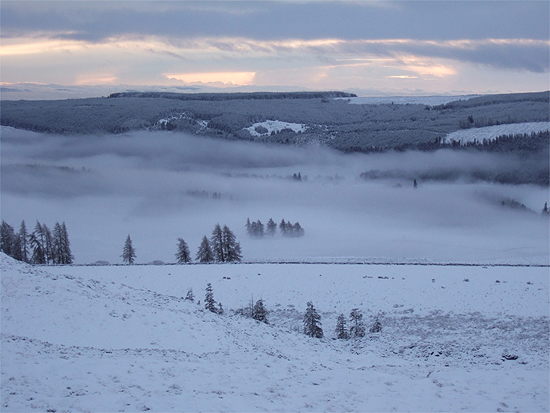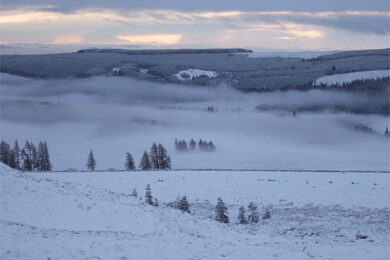I’m thrashing my way through some woodland with a couple of other chaps. Our clothes and hair are full of pine needles and thorns. And we’re sweating, having just made it over a couple of electric fences and past the pheasant pens without the birds squawking and therefore giving an indication of our whereabouts.
So what are we doing? Well, believe it or not, we aren’t poaching game – we’re hill-walking. We’re trying to reach the summit of a notoriously tricky summit on the English-Welsh border. The land is on a private estate belonging to some posh royal bastard or other, and is guarded by gamekeepers, whose houses surround the hill. We’ve heard many reports about this hill before – other walkers have been pursued by the gamekeepers, armed and on quad bikes.
So why on earth are we doing this? There certainly won’t be much of a view from the wooded top anyway. The answer perhaps varies for all three of us, but it would be fair to say that we share an addiction – an addiction to reaching all the significant summits in Great Britain. The vast majority of these ‘significant’ summits are well-loved mountain peaks or rocky little hills overlooking the sea. But some of them are deeply unpleasant, so unpleasant that there is indeed a perverse pleasure in ‘bagging’ them and then comparing notes at some country pub or other later in the evening. The summits might be impossible to reach without trespassing, in such dense woodland that it’s hard to tell where the actual summit is, or near to a house whose grumpy inhabitants like to tell all walkers to clear right off. And this particular swine is in all three categories.
Although there have been hill obsessives of my ilk for many decades, this particular craze of somewhat limited appeal really began in 1992, after the publication of Alan Dawson’s Relative Hills Of Britain. The book lists all the hills in Scotland, England, Wales and the Isle of Man with a drop of 150 metres on all sides, from popular Ben Nevis and Lakeland peaks such as Helvellyn to obscure, pathless tops in the Outer Hebrides and little grassy bumps along the South Downs. There are currently 1554 of them and they even have a name – the Marilyns. The name is a humorous nod to the better known (but far more limited in number, hilarity, variety and geography) Munros of Scotland.
I’ve so far reached the summit of just over 600 of them, and so this year I will have my name added to the Marilyn Hall Of Fame, alongside a couple of hundred others. Many of these people have devoted decade upon decade to exploring every nook and cranny of the British Isles, and, as you might expect, many of them are fairly eccentric. Some have lived in their car in supermarket car parks to satisfy their addiction, or resided in a camper van in the Lake District, still turning up for work every weekday in a nearby town after having spent each and every night wandering the wildest areas of our incredible islands. One Scottish gent even goes as far as to ascend all the Marilyns wearing his kilt – from rugged, isolated mountain peaks to Southern England tiddlers such as the high field near Lewes – it as a golf course on top. Some take a secondary interest in the often-beautiful cement triangulation pillars, built by the Ordnance Survey to obtain accurate data for their maps. Others like to set themselves mad challenges such as reaching 24 summits in 24 hours, or climbing over 500 Marilyns in the course of a year. There are countless bizarre stories – sometimes involving the police, who understandably find it hard to believe what someone was doing trudging across farmland at 2am in order to ‘complete section 28’.
Of course you can climb the same hill a thousand times and it will be different on each ascent. But the list-ticking adds a new layer of meaning to the pursuit and it encourages you to explore every part of these islands. It is, perhaps, the ultimate orienteering exercise, though it’s never a good idea to be blinded by the need to reach the summits to the extent that you rush or fail to take in the quiet pleasures of a stroll for its own sake. But with the Marilyns, hill-walking is both an end in itself and a means to one. We all need some purpose in our lives, and this hill-collecting business is like a whole other life I lead. Many of my closest friends can’t get their heads around it – and nor do I expect them to.



